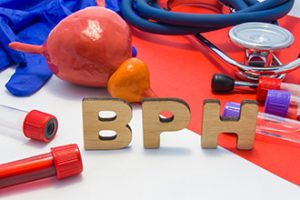
As a man ages, his prostate may become larger, a disorder known as Benign Prostatic Hypertrophy (BPH). While an enlarged prostate is neither a serious nor a life-threatening condition, it can cause urinating problems in men aged 50 years and older. Men with urinary problems should immediately see their doctor for a prompt and accurate diagnosis because symptoms of BPH are similar to those of prostate cancer. A patient should also see a doctor immediately when experiencing fever, chills, back pain, side pain, abdominal pain, bloody or cloudy urine, or pain when urinating.
Treatment of Enlarged Prostate
After a diagnosis of prostate enlargement, the urologist evaluates the severity of symptoms before recommending treatment. You are expected to participate in the decision making process to ensure you get the best treatment possible. Generally, no medications are prescribed for enlarged prostate unless the symptoms are severe, bothersome or accompanied by problems such as bladder stones or bladder infection. In fact, around 4 out of 10 men usually have no symptoms or have their symptoms improve without medications or surgery and only require lifestyle changes to manage BPH. Conversely, 1 in 4 men in their late 50s, 1 in 3 men in their late 60s, and 1 in 2 men in their late 70s and beyond can expect to have bothersome symptoms that require medications or even surgery.
Watchful Waiting
Should you take medications for treating enlarged prostate? After the diagnosis of BPH, you will have to choose either watchful waiting or medicine as your primary treatment, though surgery is sometimes necessary for serious symptoms. The best treatment option for men with minimal and less bothersome symptoms is watchful waiting. It involves combining lifestyle measures that prevent or relieve symptoms of BPH with visits to the urologist at least once a year for physical examination, testing and symptom status review.
Men managing BPH through watchful waiting must limit the amount of fluid they consume at any given time, avoid drinking fluids after 7 p.m., avoid beverages containing caffeine, avoid delaying urination, cut back on salty or spicy foods, limit alcohol intake, engage in regular physical activity and Kegel exercises, avoid cold weather and keep themselves warm, control their weight, control their blood sugar level, eat diets rich in vegetables, and avoid over-the-counter antihistamines (decongestants).
You should opt for watchful waiting if:
- (a) You experience mild and less bothersome BPH symptoms.
- (b) The side effects of the medicine may bother you more than the mild symptoms of BPH.
- (c) You can attend regular medical checkups (at least once a year).
- (d) You can effectively use special bathroom techniques, cut back on your fluid intake and change your lifestyle.
Medicines
If your symptoms are severe or worsen during watchful waiting, you should consider taking BPH medications. The three types of drugs commonly used for treating enlarged prostate are alpha-blockers, 5-alpha reductase inhibitors and phosphodiesterase-5 inhibitors. Alpha-blockers are fast-acting drugs that relax prostate muscles and relieve urination problems within a few days or weeks. They include terazosin (Hytrin), doxazosin (Cardura), prazosin (Minipress), silodosin (Rapaflo), Alfuzosin (UroXatral) and tamsulosin (Flomax). Drugs called 5-alpha reductase inhibitors such as dutasteride (Avodart) and finasteride (Proscar) cause shrinkage of the prostate and improve symptoms, albeit after several months. Phosphodiesterase-5 inhibitor called tadalafil (Cialis for daily use) has also been approved for use in treating BPH.
 When using a prescription for managing enlarged prostate, you will take the pills every day for life, have regular medical checkups, and use special bathroom techniques such as relaxation and double voiding. The medicines will reduce the risk of urinary retention, relieve symptoms and minimize risks of future surgery. However, prescriptions are often expensive and come with certain side effects such as trouble getting an erection, diminished sex drive, tiredness, dizziness, and stuffy nose.
When using a prescription for managing enlarged prostate, you will take the pills every day for life, have regular medical checkups, and use special bathroom techniques such as relaxation and double voiding. The medicines will reduce the risk of urinary retention, relieve symptoms and minimize risks of future surgery. However, prescriptions are often expensive and come with certain side effects such as trouble getting an erection, diminished sex drive, tiredness, dizziness, and stuffy nose.
Conclusion
When you have problems urinating, you should immediately see a doctor as you may have an enlarged prostate. At the urology clinic, the doctor will perform a physical exam and run a few tests to find out if you have BPH. If BPH is confirmed, the urologist will explain to you the treatment options available, such as watchful waiting, medications and or surgery for serious cases. The treatment option chosen will depend on the severity of symptoms and your desire to improve the quality of your life. You should consider watchful waiting if you have mild symptoms and want to avoid the adverse effects of drugs. However, in case of severe BPH symptoms, you should take medications to relieve symptoms and possibly prevent the need for surgery in the future. For more information on treating an enlarged prostate, visit St Pete Urology in St Petersburg, Florida.





